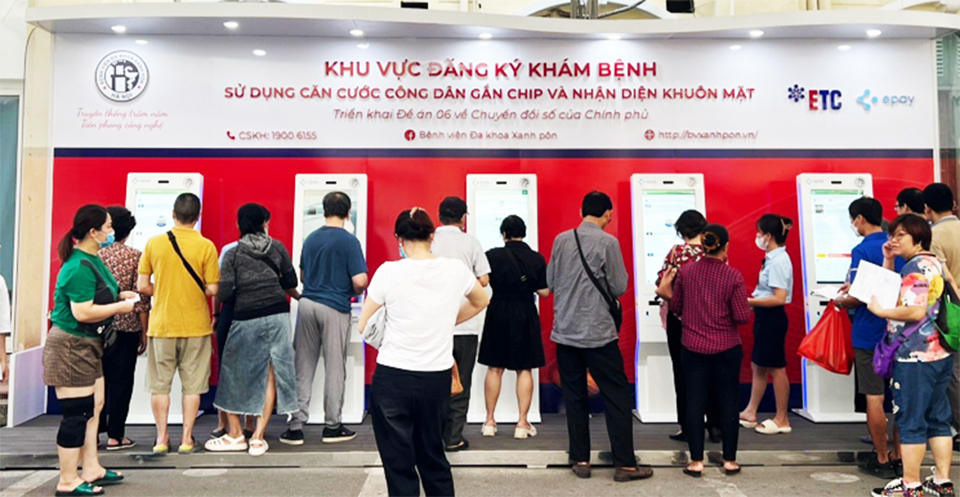Hanoi's healthcare sector embraces technology for better services
Hanoi is on its way to equipping an advanced healthcare system that responds to the needs of its people and supports the city's goals of smart urban development.
To enhance public health and healthcare services, the Hanoi Party Committee has launched Program No. 07-CTr/TU, which sets the digital transformation of the healthcare sector as a top priority for the period 2021-2025.
This initiative is expected to revolutionize the way healthcare is delivered in the capital, ensuring that residents receive high-quality services while laying a solid foundation for the sustainable development of the sector.
| Self-service kiosk at Saint Paul General Hospital. Photo: Thanh Binh/ The Hanoi Times |
Advancing smart healthcare solutions
To bring this vision to life, the Hanoi health sector has rolled out Project No. 05, which aims to integrate smart healthcare information technology (IT) from 2023 to 2025.
According to Vu Cao Cuong, Deputy Director of the Hanoi Department of Health, the project targets three key groups, including the public, healthcare providers, and health management authorities. This innovative system is designed to empower citizens to take charge of their health by providing easier access to vital information and timely medical advice.
"By creating a smart healthcare system, we're not just improving services, we're transforming the patient experience," he said. "This initiative will streamline medical services, saving time and money while reducing the strain on our hospitals."
He underlined that the smart management system will enable rapid policy decisions backed by big data analysis, enhancing the city’s ability to respond to health emergencies such as disease outbreaks.
In just one year, every healthcare facility in Hanoi has adopted patient management software that seamlessly connects to the city's social insurance system and fully complies with Ministry of Health standards.
All facilities also use chip-embedded cards and the VNeID application for patient registration.
In a significant leap forward, five hospitals, including Phu San, Saint Paul, My Duc, Van Dinh, and Hoe Nhai, have successfully transitioned to electronic medical records. In addition, several facilities are using cutting-edge technologies such as artificial intelligence (AI) and virtual reality to improve diagnosis and treatment protocols.
The health sector is also aligning its digital transformation efforts with the government's Project No. 06/CP, which focuses on leveraging population data and electronic identification. To date, more than 8.1 million residents have had their health information standardized, and nearly 18.5 million patient visits have been synchronized into the city's health record system.
A standout feature of this transformation is the self-service kiosk model, which has drastically reduced patient check-in times from 5-15 minutes to just 10 seconds. "This innovation not only saves time but also cuts costs," said Ngo Quang Hung, Deputy Director of Xanh Pon General Hospital. "Each kiosk can replace one staff member, potentially saving the hospital more than VND265 million (US$10,750) annually."
Building a robust healthcare framework
Cuong, from the Hanoi Department of Health, emphasized that the journey to a smart healthcare system is a multi-stage endeavor that requires defining specific goals at each stage.
Looking ahead, Hanoi's healthcare sector is committed to continuing its digital transformation, adopting electronic medical records, and securing resources to upgrade its IT infrastructure. It will also focus on ensuring that digital healthcare services are secure and compliant with legal standards while developing a shared data repository that facilitates connectivity and information sharing.
With these ambitious plans, Hanoi is on track to create a modern, high-quality healthcare system that not only meets the needs of its citizens but also contributes to the city's broader smart urban development initiatives, ultimately creating a more effective and sustainable healthcare environment for all.












